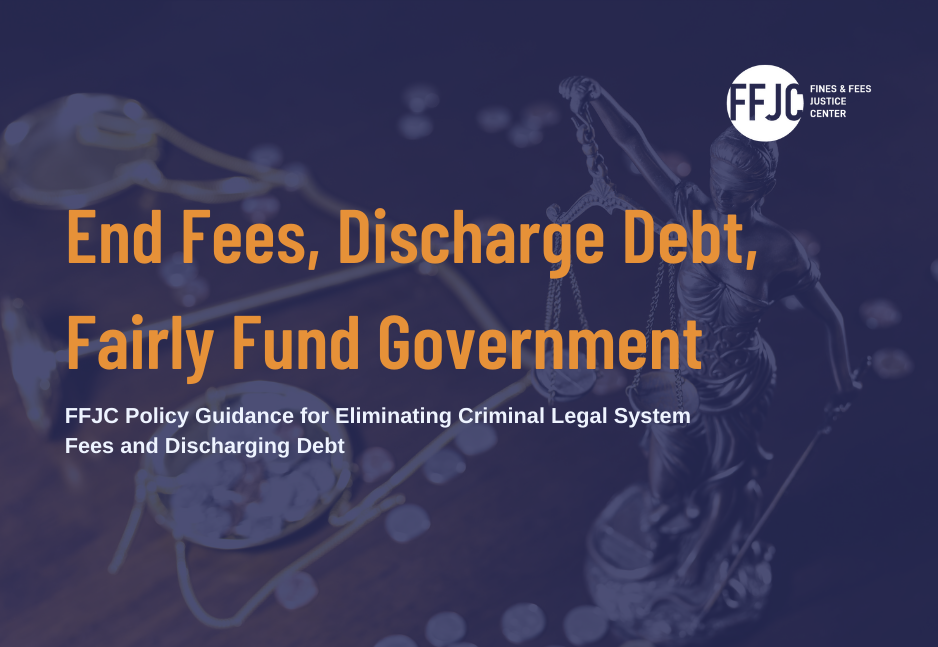New policy guides provide states and local governments with recommendations for eliminating fees and debt relief
Today, the Fines and Fees Justice Center (FFJC) released the second in its series of policy guidance publications: Terminal Fees, Debt Relief, Fairly Fund Government.
In recent decades, state and local governments have increasingly turned to police, prosecutors, and judges for revenue. They have dramatically increased the number and size of the fees slapped on people in the criminal justice system for everything from minor traffic and community violations to misdemeanors and felonies — and employing draconian tactics to collect them.
People who cannot afford these fees face penalties that trap them in a cycle of poverty: imprisonment, prolonged or indefinite surveillance, driver’s license suspension and additional fees. Low-income communities of color are suffering the most as state and local governments seek to extract them billion of dollars from individuals and their families.
The Policy Guidance describes the number and type of charges in the US criminal justice system, the history of the charges, the problems that cause their collection and collection, and FFJC’s policy recommendations.
In addition to the penalty imposed by a court for breaking the law, there are charges at virtually every point in the criminal justice system. Fees only exist to raise money for state and local governments. This hidden, regressive tax system is now enshrined in jurisdictions large and small across the United States. Nonetheless, available evidence shows that ccities and states output at least 41 cents just to collect a single dollar in fines and fees — 115 times more than the IRS spends to collect a dollar of income tax. And some spend more on collections than they bring in.
“When states and localities rely on fees to balance their budgets, they encourage for-profit policing, criminalize poverty and trap families in a cycle of poverty and punishment.” Shelp Shanelle Johnson, Senior Policy Counsel at the Fines and Fees Justice Center. “Politicians have much fairer and more efficient ways to generate revenue.”
Momentum to eliminate fees and pay off debt is rapidly increasing among state and local policymakers. FFJC’s guidelines document dozens of state and local fee elimination policy changes over the past 5 years, in both red and blue states. With successive new laws in 2020 and 2021 California has enacted some of the most far-reaching reforms to date — Eliminated 40 charges (including probation, probation and local booking fees) and paid off over $16.5 billion in court debts.
FFJC recommendations include:
- Eliminating all court fees, surcharges and costs while replenishing any actual revenue lost from eliminated fees.
- Elimination of all debt, cancellation of warrants, cessation of all collections (including private collections) and reinstatement of driver’s licenses suspended for court guilt.
- Funding of government, including the judicial system, through common funds and equitable sources of revenue.
- Elimination of fees for medical visits to people in custody, while hygiene products and other necessities are made available free of charge.
- Providing detainees with free, easily accessible phone, email, video and tablet communications.
- Eliminating fees associated with adding funds to commission accounts and accessing funds in commission accounts, while ending markups on items purchased on commission.
- Using American Rescue Plan Act funds or other eligible funds to make up for lost revenue from programs that have paid off debt.
“Relying on fees for revenue is a counterproductive economic policy that undermines public safety and harms our most vulnerable communities — especially communities of color,” he said Priya Sarathy Jones, National Policy and Campaigns Director at the Fines and Fees Justice Center. “Politicians from across the political spectrum are increasingly recognizing this Getting rid of these hidden taxes is a win-win for both struggling families and the bottom line of their jurisdiction.”
In November 2020, FFJC released the first of its policy series, Getting Started Toward Fairer Fines and Fee Practices: Policy Guide to Financial Ability Assessments, Payment Plans, and Community Services.
###


Comments are closed.